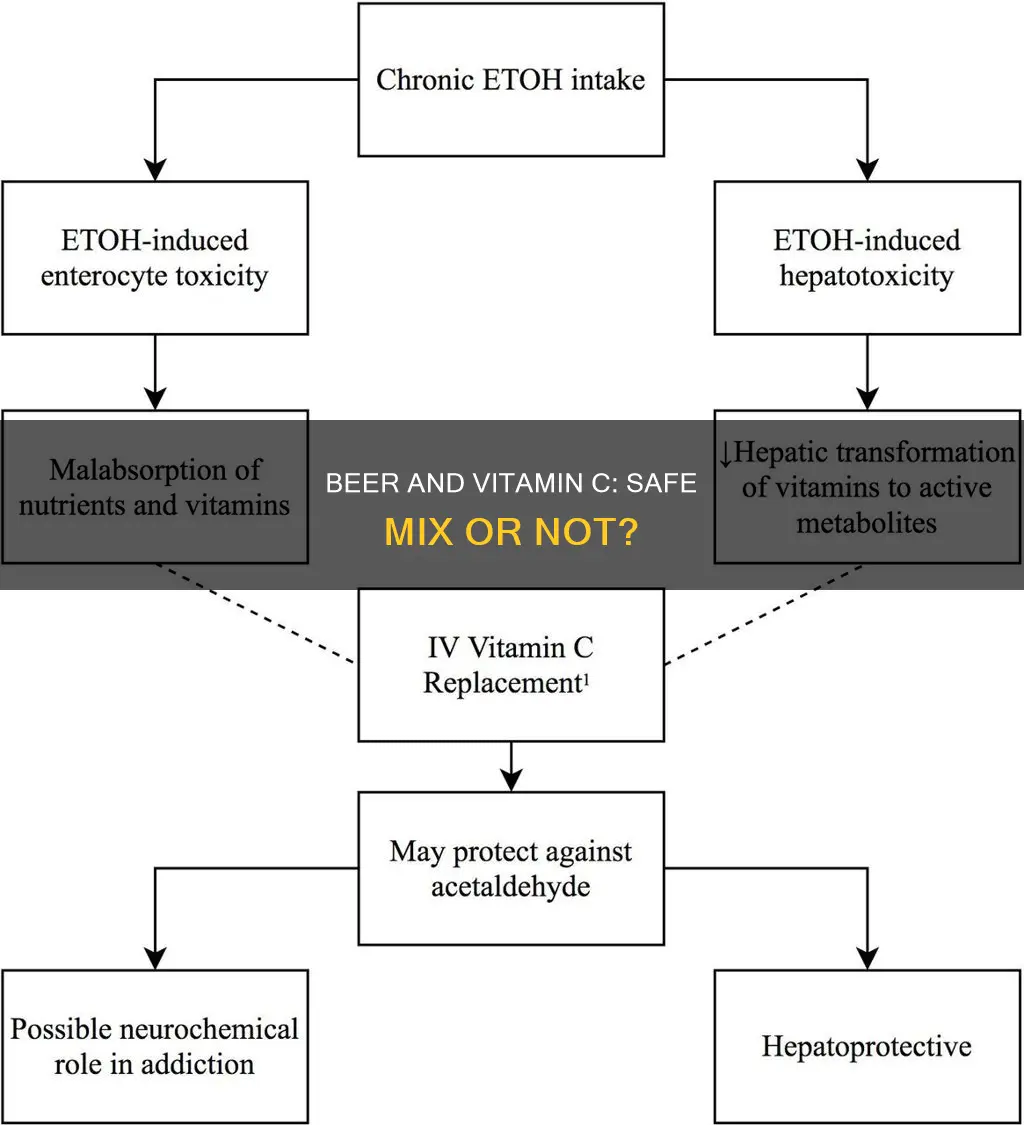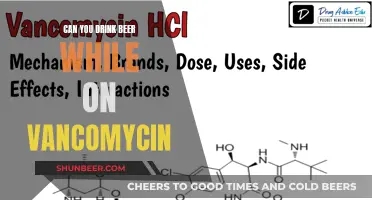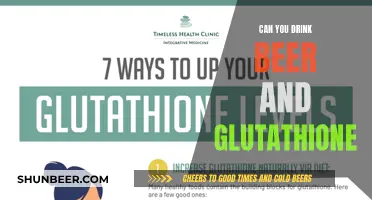
Vitamin C is an essential nutrient that must be obtained through diet as the body cannot produce it. While it is most commonly associated with immune health, it also plays a role in collagen synthesis and antioxidation. Although there is no evidence that vitamin C helps with hangovers, it may support the body's natural defences by neutralising the free radicals produced when alcohol is metabolised in the liver.
Chronic alcohol use is a risk factor for vitamin C deficiency, which can be quickly restored with over-the-counter vitamins. However, for the healthy individual who drinks socially, alcohol does not deplete vitamin C levels, and it is safe to take vitamin C with alcohol.
| Characteristics | Values |
|---|---|
| Can vitamin C help with hangovers? | There is no evidence that vitamin C helps with hangovers. |
| Is vitamin C involved in alcohol metabolism? | No, vitamin C is not involved in alcohol metabolism and does not speed up how fast alcohol is broken down. |
| Does alcohol deplete vitamin C levels? | Alcohol does not deplete vitamin C levels in healthy individuals who drink socially. However, chronic alcohol use is a risk factor for vitamin C deficiency. |
| Can vitamin C be taken with alcohol? | Yes, vitamin C is generally well-tolerated with minimal side effects and there are no negative interactions between the two. |
| What are the health benefits of vitamin C? | Vitamin C is vital for the normal production of collagen, which makes up connective tissues such as skin, bones, gums, and organs. It is also a powerful antioxidant that neutralizes "free radicals", which are charged particles that damage cells and cause inflammation. |
What You'll Learn

Vitamin C does not speed up alcohol metabolism
Vitamin C is an essential water-soluble nutrient that plays a role in various biological reactions in the body. It is necessary for enzymatic reactions, the biosynthesis of hormones, and protecting biomolecules through its antioxidant properties. While vitamin C has well-proven biological functions, its therapeutic utility has been contested over the years.
Chronic alcoholism is a significant public health issue, and excessive alcohol consumption is a known risk factor for vitamin C deficiency, which can lead to scurvy. However, the link between hypovitaminosis C and chronic alcoholism is not yet fully understood, and vitamin C replacement regimens are not standardized.
While some studies have suggested that vitamin C may play a role in ethanol oxidation and could potentially reduce hepatotoxicity, the evidence is limited and conflicting. Some studies have shown that vitamin C pretreatment can enhance blood ethanol clearance, while others have found no significant positive effects of vitamin C supplementation on alcohol metabolism.
Overall, while vitamin C may have beneficial effects in protecting against liver damage caused by alcohol consumption, there is insufficient evidence to conclude that it speeds up alcohol metabolism.
Deep Cleaning and Beer: What's the Deal?
You may want to see also

Vitamin C is safe to take with alcohol
Vitamin C is an essential nutrient that can only be obtained through diet. Citrus fruits, berries, tomatoes, potatoes, and green leafy vegetables are excellent sources of vitamin C. It is well known for its role in supporting immune health, but it also has other vital functions, including collagen synthesis and antioxidation.
While alcohol does not deplete vitamin C levels in healthy individuals who drink socially, chronic alcohol use is a risk factor for vitamin C deficiency. This is thought to be due to a combination of poor nutrition, liver inflammation, and reduced absorption of vitamin C from the gut.
It is important to note that while vitamin C can be beneficial when taken with alcohol, it is not a magic cure for hangovers. The best way to prevent a hangover is to drink within your limits, stay well-hydrated, and eat a meal before drinking.
Beer Overdose: Kidney Stones and Health Risks
You may want to see also

Alcohol does not deplete Vitamin C levels in healthy individuals
While there are many negative health impacts of alcohol, the good news is that alcohol consumption does not deplete vitamin C levels in healthy individuals who drink socially.
However, chronic alcohol use is a different story. Alcoholics are at risk of vitamin C deficiency, which can be fatal. This is thought to be due to a combination of poor nutrition, liver inflammation, and reduced absorption of vitamin C from the gut.
In fact, vitamin C can be beneficial for those who drink socially, as it may help to prevent or reduce the severity of hangovers. This is because vitamin C can speed up the metabolism of alcohol by the liver.
If you are drinking, it is still important to take care of your body in other ways. Alcohol is a diuretic, which means you need to drink extra water, both during and after drinking alcohol, to avoid dehydration.
It is also a good idea to eat a meal before drinking, and to avoid dark-coloured drinks such as red wine and whiskey, as these contain congeners, which are known to make hangovers worse.
If you are an alcoholic, it is important to focus on dealing with this issue first. Alcohol will make any health issues worse.
Beer and Vicodin: Safe Mix?
You may want to see also

Alcoholics may benefit from Vitamin C as it can reduce alcohol cravings
Alcoholics may benefit from taking vitamin C supplements, as they can help reduce alcohol cravings and support the body's recovery process. Vitamin C is an antioxidant that protects cells by preventing damage from free radicals. It also supports immune function and helps repair damaged tissues, which can reduce alcohol cravings and improve overall health.
Chronic alcohol use can lead to malnutrition and vitamin deficiencies. Not only does it reduce appetite, but alcohol also makes it harder for the body to process and absorb essential nutrients. This can cause a range of health issues, including liver damage and a weakened immune system. Vitamin C supplementation can help address these deficiencies and support the body's recovery.
Additionally, vitamin C may play a role in reducing alcohol cravings by regulating neurotransmitters and providing antioxidant support. It is involved in the production of glutathione, a powerful antioxidant that can be depleted by alcohol use. By replenishing glutathione levels, vitamin C may help to reduce cravings and ease withdrawal symptoms.
While vitamin C can be beneficial for alcoholics, it is important to note that it should not be relied upon as a standalone treatment for alcohol use disorder (AUD). A comprehensive approach to recovery should include therapy, support, and addressing nutritional deficiencies. Consulting with a healthcare professional is recommended to ensure safe and effective treatment.
Can Passengers Drink Beer in Virginia?
You may want to see also

Vitamin C can be quickly restored with over-the-counter vitamins
Vitamin C, also known as L-ascorbic acid, is a water-soluble vitamin. Unlike most mammals and other animals, humans do not have the ability to synthesize vitamin C and must obtain it from their diet. Vitamin C is an essential cofactor in several enzymatic reactions, such as the biosynthesis of collagen, carnitine, and neuropeptides, and in the regulation of gene expression. It is also a potent antioxidant.
Vitamin C is available over the counter in many forms, including ascorbic acid, sodium ascorbate, calcium ascorbate, and ascorbyl palmitate. There is little scientific evidence that any one form is better absorbed or more effective than another.
Vitamin C is generally well tolerated, and there is no reliable scientific evidence that doses of vitamin C up to 10 g/day in adults are toxic or detrimental to health. An upper intake level of 2 g/day is recommended to prevent some adults from experiencing diarrhea and gastrointestinal disturbances.
Overall, regular use of vitamin C supplements shortens the duration of the common cold but does not reduce the risk of becoming ill. Taking supplements once cold symptoms have already begun has no proven benefits.
Antibiotics and Non-Alcoholic Beer: What You Need to Know
You may want to see also







